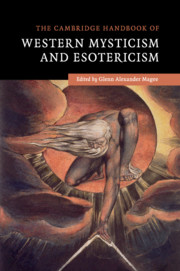Book contents
- Frontmatter
- Dedication
- Contents
- Acknowledgments
- Editor's Introduction
- List of contributors
- I ANTIQUITY
- II THE MIDDLE AGES
- 8 Sufism
- 9 Kabbalah
- 10 Medieval Christian Mysticism
- 11 Hildegard of Bingen and Women's Mysticism
- III THE RENAISSANCE AND EARLY MODERNITY
- IV THE NINETEENTH CENTURY AND BEYOND
- V COMMON THREADS
- Suggestions for Further Reading
- Index
- References
11 - Hildegard of Bingen and Women's Mysticism
from II - THE MIDDLE AGES
Published online by Cambridge University Press: 05 May 2016
- Frontmatter
- Dedication
- Contents
- Acknowledgments
- Editor's Introduction
- List of contributors
- I ANTIQUITY
- II THE MIDDLE AGES
- 8 Sufism
- 9 Kabbalah
- 10 Medieval Christian Mysticism
- 11 Hildegard of Bingen and Women's Mysticism
- III THE RENAISSANCE AND EARLY MODERNITY
- IV THE NINETEENTH CENTURY AND BEYOND
- V COMMON THREADS
- Suggestions for Further Reading
- Index
- References
Summary
Frauenmystik or “Women's Mysticism”
In the Middle Ages, Christian women as well as men committed themselves to the practices of prayer, meditation, and asceticism that were the conditions usually associated with the mystical life. Some of them also committed themselves to producing texts in which they strove to communicate what they learned through their practices. The history of scholarship on medieval Christian mysticism has traditionally privileged texts by male authors as representing the pinnacle or at least the mainstream of mystical accomplishment, thereby marginalizing texts by women as secondary or derivative. Recent attention to women's texts as representing “feminine” mysticism is usually marked by an insistence on their affectivity and on “paramystical” physical phenomena. These approaches obscure how thoroughly affective many mystical texts by men are, how male mystics were often influenced by women, and how male texts about female mystics tended to emphasize paramystical experience. “Women's mysticism” is thus a problematic category, and the attention to women's mystical texts in this essay is not an assertion of any inherently female essence to the subject matter. What is common to most if not all women's mystical literature is an awareness of the suspicion about women's authority to teach, or a discomfort with cultural assumptions about the nature of women and their religiosity. These commonalities are due, of course, not to an essential female nature but to women's awareness of cultural norms that ascribed to them a particularly carnal nature, and that positioned men as authoritative teachers, mediators of sacramental grace, and confessors of sins.
I offer here a characterization of mystical life that is relevant for the study of both male and female medieval mystics. It is a life structured by “tuning” the self – body, mind, and emotions – to seek the presence of the divine, and preparing the self to be invaded or flooded or lifted up, thus losing a clear sense of the boundaries of the self. The emphasis here is on a structured life of practice, not a single type of “peak experience.” Furthermore, where extraordinary psychological experiences are described, they are often not the primary focus of the authors’ concerns; rather, mystical authors are often primarily concerned with praising God, teaching proper devotion, and leading the moral life.
- Type
- Chapter
- Information
- The Cambridge Handbook of Western Mysticism and Esotericism , pp. 118 - 130Publisher: Cambridge University PressPrint publication year: 2016
References
- 1
- Cited by



